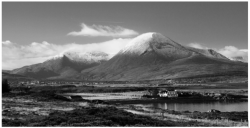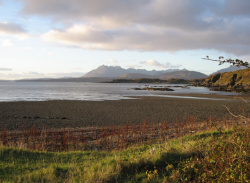Notes from a small island (1)

For 30 years or more, we’ve been coming to the Isle of Skye at the end of October. Thirty years ago you could more or less rely on frosty nights and snow on the Cuillin. The world is warming, and these days it’s more likely to be raining, blowing in from the west below the overcast.
But it’s still a magic place. I find it next to impossible to say what the magic is. The first time I came I’d driven overnight through a blizzard; the view from the ferry was spectacular. The Red Cuillin blinding white in a blue sky. And then it siled down for a week. I had no idea how big this ‘small island’ actually is. Because of its fjord coastline, a crow flight of four miles was a 15-mile drive on single track roads. That was to get to the Co-op in Broadford, a barn-like building that seemed to mainly sell potatoes, white sliced bread, whisky and Carlsberg Special Brew. (It’s now in bang-up-to-date premises and sells everything you could reasonably ask for).
But then, on the last day, the skies cleared, and from the hill above Tarskavaig there was this astonishing panorama....the whole of the Cuillin, the tops smudged with snow, the sea steel blue and whitecapped. There was the magic. Part of the spell is the way mountains grow straight out of the sea; it’s also the wildness of weather, the unpredictability of it all. It’s the colour. It’s red deer startled among birches. Anyway. We love it.
So while we’re here, instead of postcards, I’m sending poems and pictures.
I’ve never managed to lose that image of the hill behind Broadford on that first cold morning. Bheinn na Caillich. The man who used to run the art materials shop was the one who told me the story of the cairn on the summit, the burial place (it’s said) of a Norwegian princess who the locals call Saucy Mary, and who was notorious for installing a chain across the narrows at the Kyles, and levying a toll on shipping. It took me a long time, but I eventually wrote this poem for her.

Because they had the mastery of iron,
because the land was thin and hard,
because the sea was the way to everything,
because nothing could gainsay
a well-caulked, lapstraked boat
with a flare at the bow that perfectly
fit a space the water would make for it,
because their oceans were swanspaths, whaleroads.
because they wrote their maps in the wind,
in the run of the cod, of the herring, of the cloud,
the way the gulls would go; because of that
they sailed out from granite fjords;
cargoed with amber and jet and beaver pelts,
red river gold and wolfskins;
over the Dogger, the mouth of the Rhine,
round Cape Wrath, to the Irish Sea, Biscay,
the gates of the Mediterranean,
its hot shores, its painted boats
and whitesailed dhows as bright as ghosts,
and all for the lapis, amethysts, white gold
they spun into knotwork dragons swallowing their tails;
bracelets, cloakpins, breastpins, clasps and rings.
Who counted the hours of tillage,
the scantlings of barley and oats,
the frozen sleet on longship shrouds,
skin torn on intractable nets,
or how many million herring and cod
shrank in the wind on racks of spruce?
Who told how it was
after all the work of hands and years,
they could fashion chests of black bog-oak,
bind them with ironstrips,
lock up the lapis, the gold, the bright enamels
and bury them high in the eye of the wind
on a red granite summit over snowfield and scree
in a grave with a princess anointed and shrouded,
how they might raise a great cairn,
chockstone and boulder,
and no one would touch it.
(published in Much Possessed, smith|doorstop 2016]
It’s hard to feel affectionate about Saucy Mary; but the story goes that her dying wish was to be buried in the eye of the north wind, and so it was. Someone felt something for her, if only fealty.
Legends tangle themselves up in the landscapes of Skye. And so does poetry. I once went up there on my own ‘to write’. I should know better. Solitude is fine, but not for me as a writer. It just makes me timidly introspective. And in any case, as Helen Mort says, “you can make a poem ‘be’ but it won’t be any good”. However, I’d go off up into the moorland with my pencil and notebook, and look as though I meant something. I’d scribble a lot, all very impressionistic, all very imagist, but when I came to look at it all I could see and hear was second-hand Ted Hughes. The poem that came out of this experience spins on the fact that the week I was trying to exorcise the spirit and register of Ted Hughes was the week in which he died. Of course, having no newspaper or radio, I only found out when I got home. The finished poems collages/stitches in phrases and images from various of his collections, Moortown, and Remains of Elmet especially. Horizons feature prominently.

As the heron creaked clear
of the wet alders by the brown burn,
taking a line from the curve of the fell
where the eagle had mantled
and flown lazy and sure to the far edge of things,
you were watching, old hawk, among the crofts,
the sheep staring mad-eyed
at your insurance man’s suit
shiny at cuff and collar, creased at knee, at elbow.
You watched and talked all that wet day,
your gritstone vowels, your cadences
open as the sky; falling for ever.
You were there on the shoreline,
rooting through the blueprint bones
of sheep, those scattered vertebrae,
this relic jawbone clamped on silence
among the stones, the hiddle of baling wire,
mired iron sheeting, rust.
Across the green and sopping parks
sheep huddled in the lithe of the long wall,
and beyond, on the bareblown hill
the deer were waiting for you and me;
alert and wary, then, pouring easy as light
up the tumbled slopes and out of sight,
in those gulleys gouged in the cold hills.
Heaven poured down on Rhum,
fans and blades of honey, silver-gilt.
As we walked and watched that day
in Achnacloich; old hawk, you saw
the pressed dry grass where the deer lie,
a single slot in a cup of peat;
the buttresses of turf, of heather, tangled whin,
and, always the horizons calling
until, far below and far away,
the wood was a struggle
a scattering foil of birch and bloodbead ash.
There we stood in the high place
where rock was kneeling, clean and dry and bright
and all the earth was a stage
for the performance of heaven.
The tumbling outcrops fell away;
away, away beyond the foundering islands,
beyond the damascened sea.
The stones, the light, the rain,
all fixed in the reflex of your hawk’s eye.
Wherever I walked in Achnacloich,
The Field of Stones, that day.your words,
joined with earth and engraved in rock
were under my feet. That day.
(Ted Hughes d.October 28 1998)
The next post will say more about Achnacloich and its crofters, and also about Tarskavaig and a chance encounter. See you all there.




